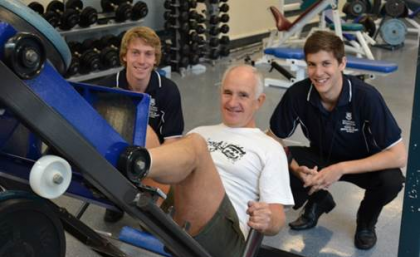
Caffeine may improve exercise capacity and reduce fatigue in cancer survivors, a University of Queensland study has found.
The study is the first of its kind to investigate whether caffeine, the world’s most commonly used stimulant, can help prostate cancer survivors exercise.
Dr Tina Skinner from the Centre for Research on Exercise, Physical Activity and Health at UQ's School of Human Movement Studies said that caffeine might be an effective way to encourage exercise in prostate cancer survivors, improving their health.
“Cancer survivors face unique challenges relating to the risk of cancer recurrence and the development of other chronic diseases, as well as experiencing treatment and disease-related physical and psychological side-effects,” she said.
“Common side-effects such as fatigue, pain, nausea and other symptoms make it difficult for cancer survivors to exercise at the optimal intensity for health benefits.
“Our study suggests that consuming caffeine one hour prior to exercise improves exercise capacity and muscular strength in prostate cancer survivors.”
A randomised controlled trial was carried out on 30 prostate cancer survivors who consumed either approximately six milligram per kilogram of their body mass of caffeine, or a placebo, one hour prior to completing a battery of exercise tests.
The researchers examined immediate fatigue and perceived exertion pre and post exercise and measured changes in exercise capacity and functional performance.
“We found that caffeine appears to enhance exercise tolerance. Participants reported improved exercise capacity and muscular strength with no subsequent increase in fatigue or perception of exertion,” Dr Skinner said.
“This is good news for prostate cancer survivors as exercise can help counteract many of the side- effects of prostate cancer treatments such as decreased muscle mass, strength and bone density.”
The next step in the research process involves conducting a dose-response study to provide a recommended optimal dose of caffeine for prostate cancer survivors.
The findings of this study were presented last month at the European College of Sports Science Congress in Amsterdam, The Netherlands.
The study was conducted by Dr Tina Skinner, Rahchell Cornish, and Dr Kate Bolam from UQ’s School of Human Movement Studies.
Results have been published in the Journal of Medicine and Science in Sports and Exercise.
The study coincides with National Prostate Cancer Awareness Month, which is celebrated in September each year.
Media: Helen Burdon, +61 7 3365 7436, 0412 744 437, h.burdon@uq.edu.au and Caroline Day, +61 7 3365 6989, or caroline.day@uq.edu.au




